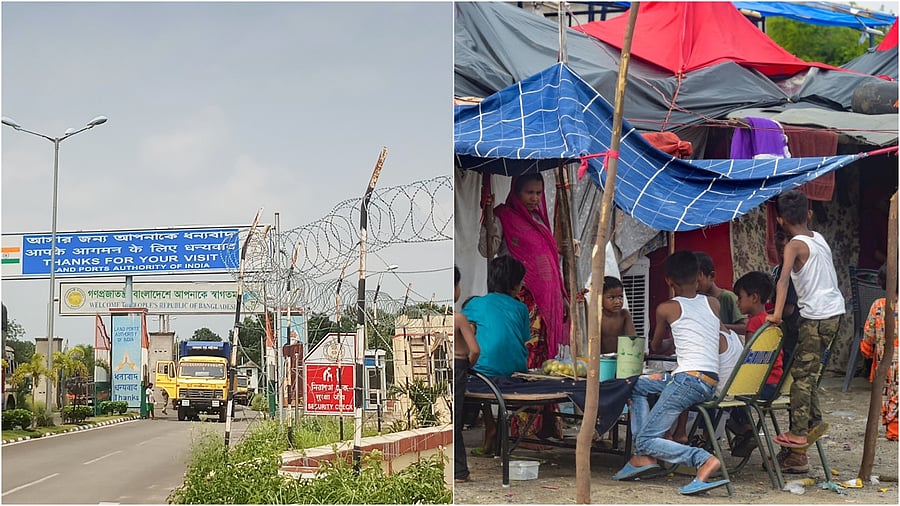
The Indian side of the India-Bangladesh border at West Bengal (L), A Rohingya migrants camp in Delhi. (Representative image)
Credit: iStock, PTI Photos
New Delhi: The Supreme Court on Friday asked the Centre to apprise it about the standard operating procedures (SOP) adopted by the governments in deporting illegal migrants, especially to Bangladesh.
A bench of Justices Surya Kant, Joymalya Bagchi and Vipul M Pancholi sought to know if the Centre wanted to build a border wall like in the US to prevent illegal immigrants from entering the country.
The court outlined the "same legacy of cultural and linguistic heritage" shared by Bengali and Punjabi speaking Indians with the neighbouring countries and speaking the same language but divided by borders. The court said the country has inherited a legacy of common culture and common heritage both in Punjab and Bengal, where the language is the same, but the border divided the country.
On the issue of curbing illegal immigration, the bench asked, "Are we supposed to build a wall like America?"
The court sought clarification from the Centre whether the use of a particular language is a presumption for being a foreigner, while hearing a plea claiming that Bengali-speaking migrant workers were being detained on suspicion of being Bangladeshi nationals.
Advocate Prashant Bhushan, appearing for petitioner West Bengal Migrant Welfare Board, informed the bench that a pregnant woman was forcibly pushed out of the country without being determined whether she was a foreigner. He said she was pushed out merely on the apprehension that she spoke the Bengali language.
Bhushan asked if the Bengali speaking is Bangladeshi also; therefore, people who speak Bengali must be Bangladeshi? He said there was some agreement with the Bangladesh government, and no individual can be pushed to any other country without the acceptance of that country.
Solicitor General Tushar Mehta, representing the Centre, submitted that the illegal immigrants know that they cannot enter India without following a proper procedure and the moment they come, they will have to explain their authentic, legitimate, and justifiable legal presence in India.
“We would like you to clarify that a certain bias in respect of the exercise of powers by authorities is sought to be demonstrated in this petition. Namely, the use of a particular language (Bengali) is a presumption of being a foreigner. Whether at all, it is correct or not, if you can clarify," Justice Bagchi asked.
The bench said it has been alleged that whoever is speaking Bangla is being targeted.
“No, this court is aware of the problem of illegal immigrants and the demographic changes. There are organisations and, unfortunately, there are governments which are supporting and thriving on illegal immigrants. We are trying to ensure that illegal immigrants do not eat away our resources, which we can divert to our own citizens,” Mehta said.
A senior counsel said an Indian language is being used to identify people. Mehta said no, and one cannot go by the media reports, and stressed that there is a systematic infiltration and there are agents who are operating.
The bench pointed out the issues associated with the porous border in Assam to West Bengal was reflected in a judgment, and there is an everyday problem of illegal entry.
Bhushan said that at some places there is daily entry, but people go back. The court, however, said there is also a lot of illegal immigration.
Bhushan said the Border Security Force (BSF) cannot say that whoever we believe is Bangladeshi and they will push him or her out of the country without any authority, ascertaining, and determining that he is a foreign citizen.
The bench asked the Centre for SOP and the procedure they follow.It said, there are two types of persons, "One who are trying to enter and they are forced back in that there should not be any difficulty; and those who have entered at one point of time and they are being identified and being sent back, for them first question would be asked show that you are Indian citizen.
"It also noted two sensitive issues here, one is national security of the country, integrity of the nation, and preservation of resources for own people here."At the same time there is a question, we inherited a legacy of common culture and common heritage both in Punjab and Bengal, where language is the same but the border divides us. So, in this situation…there is a pleading in this petition, we would like you to clarify (the use of particular language being presumed for being a foreigner,” the bench said.Mehta said individuals should come before the court, not organisations.
The bench said the court is not sure whether individuals are in a position or capacity to come before it.Mehta said legal aid can be given, and such public-spirited citizens are also required in America, where illegal immigrants are facing problems.
On this, Justice Bagchi asked: "Are we supposed to build a wall like America?"“No, we do not,” Mehta said.The Centre’s counsel emphasised that India is not a capital for the world's illegal immigration and there is a system in place. Mehta said an organization is filing these matters in court instead of any individual who was aggrieved.
Bhushan said thousands of people have been put in detention centres, causing panic among these Bengali migrant labourers because the authorities are indiscriminately picking them up, saying that you are Bangladeshi, as you are speaking the Bangladeshi language.
The court fixed the matter for further hearing in the second week of September.The plea raised concern about a letter issued by the Union Home Affairs Ministry in May 2025, which authorised inter-state verification and detention of suspected illegal immigrants.
